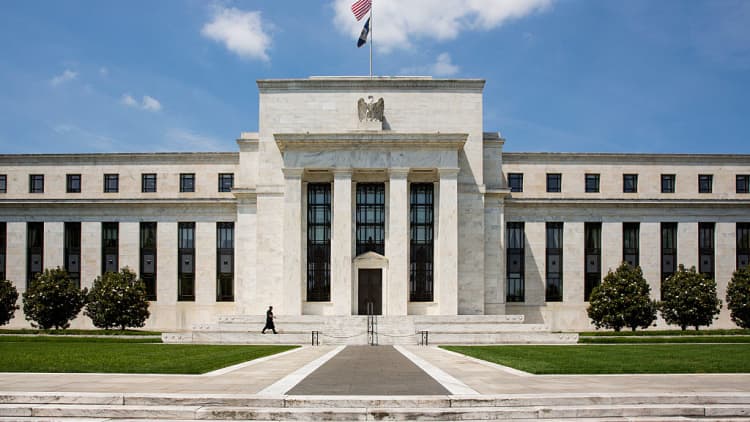
The Federal Reserve is expected to raise interest rates by a quarter point Wednesday afternoon, and more than half the respondents to CNBC's latest Fed survey expect the central bank to hike again in September.
While the market is skeptical of a second rate hike before year-end, 54 percent expect a September hike and 21 percent see a December increase. Another 11 percent expect a rate hike sometime between July and November.
The bond market has been far more negative about a second rate hike after June than economists. A weak inflation reading for May on Wednesday drove market expectations down to 36 percent for a second hike, based on fed funds futures.
Respondents to the CNBC survey have lowered their inflation outlooks dramatically since the end of last year. The respondents see inflation at 2.12 percent at year-end, down from 2.37 percent in January. The expectation for 2018 was 2.28 percent, down from January's 2.57 percent.

The survey was conducted June 8 through 10, and includes 39 of the top U.S. money managers, investment strategists and professional economists.
The CNBC survey shows a change in attitude toward the stock market rally, which most respondents believe is based on fundamentals and corporate earnings. Sixty-three percent credit fundamentals for the gains, versus 18 percent in December. Just 29 percent say the market's rise is based on Trump policies, down from 82 percent in December.
Less than half believe the market is too optimistic about upcoming policy changes, and 50 percent say the recent decline in interest rates has to do with lowered expectations for fiscal stimulus. But 45 percent said the decline in yields has to do with a lowered inflation outlook and 37 percent said it has to do with a lowered growth outlook.
The view about economic growth is also changing, as the pessimism for implementation of Trump policies increased.The economy is now seen growing 2.45 percent in 2018, down from 2.75 percent when respondents answered the survey in January.
The respondents see geopolitical risk as the biggest threat to the economy, at 21 percent, followed by protectionism, at 17 percent. In January, protectionism was seen as the biggest risk.
Forty-nine percent of the respondents said they disapprove of the job Donald Trump is doing as president, and 27 percent approve. Fifty percent, however, say they approve of the job the president is doing handling the economy, with 26 percent disapproving.
Forty-seven percent said they do not believe the Russia investigation is a threat to Trump's presidency, with 32 percent saying it could be and 21 percent unsure. A clear majority, 55 percent see the investigation reducing the chance of Trump's economic policies becoming law.


